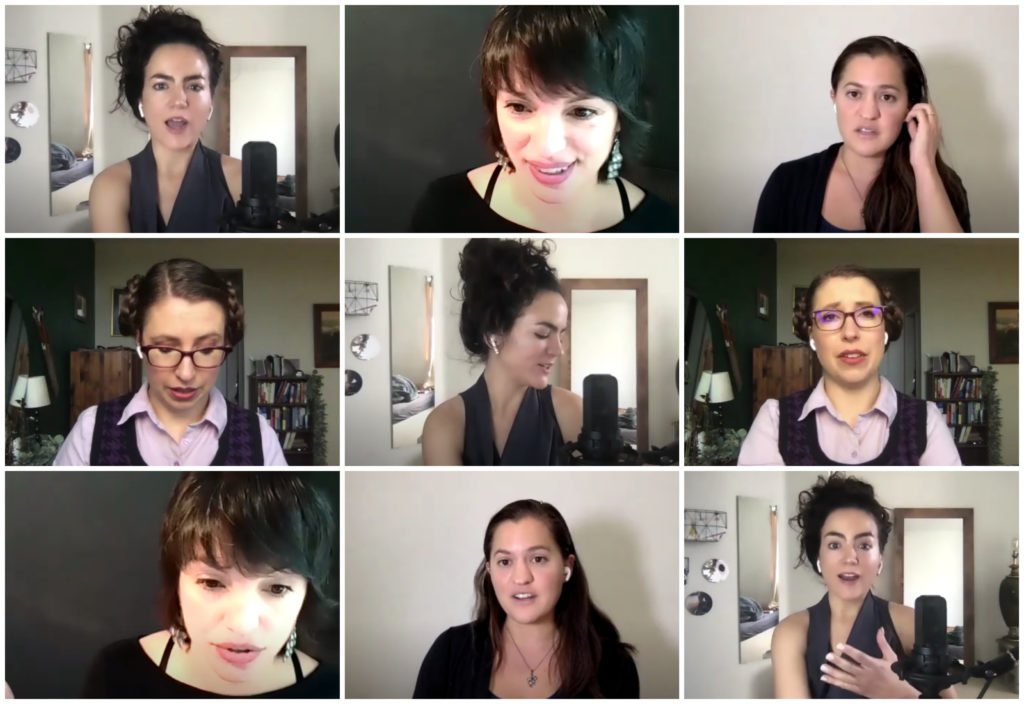In a special all-women roundtable edition of our podcast, two Red and two Blue Braver Angels leaders get passionate, personal, and curious about what led them to hold opposing views on one of the toughest political dilemmas in America: abortion.
How do voices on the left and right strengthen or weaken our country’s grasp of what’s at stake? And how do these women respond to the heartfelt, challenging questions they ask each other across the divide about legality, morality, freedom, and even murder? Featuring April Lawson (director of debates), Sage Snider (director emeritus of cultural engagement), Alma Cook (co-chair of the music team), and Mónica Guzmán (director of digital and storytelling).
Also in this episode: the women share tributes to mothers, a mother-in-law, and—in a surprising twist—their undying love for Thanksgiving mashed potatoes.
Join Braver Angels on December 2 for our national debate on abortion: www.eventbrite.com/e/national-debate-abortion-registration-207434170187
What tough topic should we tackle next month? Email media@braverangels.org to share your thoughts.
Twitter: @braverangels, @moniguzman, @AprilALawson, @HearAlma, @SageSnider





11 thoughts on “Can We Talk About Abortion? | April Lawson, Alma Cook, Sage Snider, & Mónica Guzmán”
This is my first time at the Braver Angels website and watching a video. I have a lot of thoughts about the process, but I will stick to posting my own position on abortion.
I have been consistently pro-choice throughout my life. I believe in the soul. My personal belief is that the soul does not enter the fetus until later in the process; however, this is just my spiritual belief. I cite no authority on this although I have read that my position is shared by other serious people.
Even though, this is my personal spiritual/religious belief, it is something I have no right to force onto others. This is a bedrock in my thinking. No one should be forced to live according to others’ spiritual belief.
On the practical side, a person’s right to bodily autonomy should be something we all accept as a humane way to organize society. Pregnancy is fraught with all manner of dangers. No one has a right to force someone else into danger.
The idea that we should support women through pregnancy and after in raising children is beside the point. Of course, we should do that after a woman has, herself, decided she wants to go forward with the pregnancy.
How can anyone in the USA believe their spiritual beliefs should be forced on others? This is the core of the abortion issue.
Men need to sit down and shut up about this issue. We know that they won’t because the patriarchy cannot persist without extreme control over women.
This discussion was a lot more satisfying than what you often see in the news coverage of abortion. The participants showed respect for the people on the other side, rather than being condescending or making insults. I especially liked the part where they had to consider the mistakes made by their own side.
In light of the participants’ comments about male behavior, I did find myself wishing that the roundtable had featured at least one man. But I understand the reasoning behind including only women.
These Braver Angels people are on the correct path to, at the very least, reduce these evils which you’ve outlined here. The two Reds in this podcast would likely agree with you that such draconian anti-abortion measures are abhorrent.
These Braver Angels people are on the correct path to, at the very least, reduce these evils which you’ve outlined here. The two Reds in this podcast would likely agree with you that such draconian anti-abortion measures are abhorrent.
Why do we agree without question that the state has the authority to regulate women’s reproductive health issues? Why do we allow it? When did we give up our power as individuals? How do they regulate men’s health issues in the same way? If it doesn’t, isn’t that discriminatory?
I very much appreciate the forum on this issue and applaud the speakers for participating.
This is my position, which echoes some of the others above.
Argument will not change anyone’s position on abortion.
But it is appropriate to explain one’s reasoning and to suggest that there are respectable, sincere and moral reasons to support a woman’s choice to continue or discontinue a pregnancy – in every instance through the early to mid portion of pregnancy and development, and in some instances, up to and short of the grayer stage of viability.
I have always thought that carrying a pregnancy and bringing a child into the world is the greatest, most primary responsibility a person can undertake. The changes in a woman’s life and the changes in a couple’s life are profound, both in terms of personal sacrifice, the alteration to one’s life, and the undertaking of raising a human being to maturity. It should therefore be undertaken willingly.
This has nothing to do with planned vs unplanned, but much to do with maturity, preparedness and willingness, when so much of a woman’s future is at stake and when a child’s need to be nurtured and selflessly loved is critical to his wellbeing.
My second starting point is the fundamental right of a woman, or a girl, to control her body and her future.
The right of bodily autonomy is a stronger, claim than the right to privacy, though they can be seen to be related. It goes back to English Common Law. It has long precedents in judicial law in this country, if I’m not mistaken, even if it is not explicit in the Constitution. It is fundamental to ethical medical care.
It is well established that no one may intrude upon your body without your informed consent, nor may your life be exploited for the benefit of another without your consent, even if another person’s life may be at stake. You cannot be compelled to donate blood, or an organ to another person, nor can you be compelled for your body to be put to this purpose after your death without your consent.
But a woman, if denied the freedom to choose, can be compelled to turn over her body, against her will, to serve the life of a developing, incompletely formed child. I wish that every, unborn child received high level care from early in pregnancy, when that pregnancy is wanted. But I do not believe that the unborn child has rights greater than the woman who bears it.
The core of the pro-life argument, if I understand correctly, is that the moment of conception is also the moment at which dividing cells, with their full set of genetic instructions and potentials, is endowed with a soul and therefore the right to personhood and life.
Among some lawmakers, there seems to be flexibility as to whether this state begins at implantation in the lining of the uterus, or when rudimentary myocardial muscle cells begin to contract, or when the neural tube forms into a central nervous system and a head begins to be recognizable. But these laws preclude later dates, when a brain is mature enough to begin to take in sensory signals and send out signals to effect organ function, or, later, when that child has reflexes, allowing it to breath, suck and swallow, and regulate its temperature – to survive outside of the womb.
It is noble to hold human potential as something sacred. Sadly, conferring such holiness on life at such an early stage does not make it so. The great contradiction is that each child born is not valued in this way by the societies we live in, and, sometimes, not by his or her own parents. In other words, how is it that life is so sacred at the embryonic stage, but treated with far less primacy in our value systems later?
We grown humans do not confer holiness on our own lives or the lives of others. Men and, especially, girls and women struggle everywhere in the world to have their basic rights recognized, including the right not to be sexualized and sexually oppressed.
That men dominate the legal and social decisions that we all live under, that men overwhelmingly control the writing and enforcement of laws against abortion and that men do not bear the full risks of pregnancy, childbirth, nor the full responsibility for child rearing, is not in dispute.
This sensitive, deeply personal issue is one in which women should have 10 votes for every one vote issued to men. That would look like justice, like laws serving people rather than people serving laws. But that is not what we are seeing.
If you are pro-life, I respect your choice. Please respect others who believe that women have a right to make the decision they deem best for their lives.
——-An RN with 30 years of PICU experience, a parent and someone who lost a first child to prematurity.
thank you. i was impressed by all speakers and aligned with Sage. ❤️
I am deeply disappointed in this conversation. Deeply disappointed in the lack of clear data that is now decades long that demonstrates to us the enormous impact of how unwanted children are discarded in our society. I did not see a poor woman of color, who already has two kids, represented in this conversation. FWIW, over half of the abortions in this country are performed on women who already are mothers. However, given my decades of work dealing with real human consequences of poverty and men attempting to control women, I wish these young women could see what happens to kids who are wards of the state. I wish they could see how the religions in which they were indoctrinated have caused tremendous horrors to be visited upon women for centuries. For those of you who applaud what the Supreme Court did by overturning Roe, it is now time that you take responsibility for those actions. You must demand that your elected representatives fully support women and children thru at least age 16 when those who teens must work can at least support themselves to a certain degree. That means pre-natal healthcare, universal health/dental for all citizens and fully subsidized childcare. If you are going to require an immature, not-fully-formed-in-executive-decision-making 19 year old to go full term, you bear the responsibility.
Thank you. I have been looking for a respectful debate on this issue since the Supreme Court overturned Roe. It is refreshing and grounding to be able to empathize with people I disagree with on the issue. Excellent questions and structure.
I found this quite interesting and appreciate the vulnerability you all shared. It would be interesting to have a conversation with some of us who remember when birth control first became widely available as I think it would add another layer of nuance to the discussion. I also would love to hear from men who found out later that their sexual partner aborted a pregnancy. I know some who felt the loss deeply. There are so many facets to this that almost never get brought out into the open because all the air in the room gets used up by the sound and fury crowds on the “2 sides” though only a fool would think there are only 2 sides to this.
Wonderful discussion: thoughtful on all sides.
One point to add: What is the situation into which an unplanned child will be born? What if the mother (and/or father!) is emotionally immature or narcissistic or bipolar or even abusive? What if she already has 4 children and lives in poverty? What if she is addicted to alcohol or drugs? What if she comes from an abusive family that will not support her? What will be the quality of nurturing and guidance and safety that the child actually receives? Who will take on the responsibility of supporting this child emotionally and financially throughout the next 20 years?
As an adoptive parent, I can tell you that placing a child for adoption is not an easy fix. A birth mother must spend the rest of her life wrestling with this decision, which also profoundly affects the child she relinquishes.
My position is that abortion may be a loving choice made in the best interests of the the child. I also believe it is not “murder”–it is the mother speaking gently to the child’s soul: I love you, but I’m not ready to parent you in the way you deserve. As for “murder” and “killing”, there is no malice here. And souls are eternal.